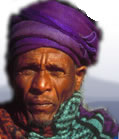THEMES IN THIS
TESTIMONY
Culture and Customs

Education

Environment

Family Life

Gender

Health

History

Identity

Livestock

Migration

Population

Social Institutions

Social Relationships

Spiritual Beliefs

Click on arrows
to find more
testimonies
featuring
these themes
|
|
Sex
|
female
|
|
|
Age
|
67
|
|
|
Occupation
|
farmer/ nun
|
|
|
Location
|
Woina Dega (midlands)
|
|
|
Date
|
May 1997
|
|
summary
This is a short interview which nevertheless contains some reasonably full answers to questions, particularly on social customs. The comments by the interviewer indicate the narrator’s willingness to be interviewed although the information given tends to be more general than personal.
The narrator expresses the view that life was better in the past. The principle causes of hardship are population growth and pressure on the land.
detailed breakdown
|
You will need a password from Panos to view the full
transcript of the interview. To apply for a password, click here.
Once you have a password, click here to go to the beginning
of the transcript. You can also click on any section of the
breakdown of content below and go straight to the
corresponding part of the transcript.
|
| Section 1 |
Former farming practices, including leaving the land fallow for part of the year.
|
| Section 2 |
Declining land productivity: “The farmland has been eroded by flood and does not produce food. The soil has been washed away and the land has become barren.” Shortage of grazing land and death of animals from starvation.
Increase in crop pests; spraying of crops by the Agricultural Bureau. Increase in provision of health services but loss of immunity because of food shortages.
|
| Section 3 |
Religious customs. Marriage – premarital sex unheard of in the past but now “the boys and girls have gone beyond the control of their parents”. Changes in methods of obtaining a divorce. Attitude of young people towards the older generation. Young people no longer interested in family history.
|
| Section 4 |
Traditional forms of hospitality, Christian and Muslim. Importance of religion to Meket people. “Today our sins have multiplied” – therefore harder nowadays to obtain absolution. Improvement in infrastructure and educational provision.
|
| Section 5 |
Increase in sexually transmitted diseases. Former use of traditional medicines: “Deaths were not frequent then as they are now.” Narrator sings a funeral dirge commonly sung in the past.
|
|


